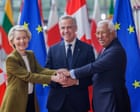
In an era characterized by evolving global dynamics, both on the geopolitical front and within internal national politics, countries worldwide are demonstrating resilience and adaptability through strategic partnerships and significant political milestones. Recent developments offer a glimpse into how nations and leaders are collaborating and repositioning themselves in response to present-day challenges.
In a significant development, Canada and the European Union have cemented a comprehensive defense pact, indicating a strengthening alliance in response to uncertainties in traditional relationships. The agreement, signed in Brussels by Canadian Prime Minister Mark Carney and EU leaders, focuses on fostering support for Ukraine and collaborating on critical global issues like climate change and artificial intelligence. This partnership reflects a commitment to addressing pressing global threats while reassuring that collaborative efforts remain strong despite a less predictable U.S. relationship under current policies.
Meanwhile, the Aukus security pact, involving the United States, United Kingdom, and Australia, is under review. Bipartisan lawmakers in the U.S. emphasize the importance of the pact as a deterrence strategy against perceived threats in the Indo-Pacific, particularly concerning China’s activities. This defense initiative originally included plans to provide Australia with nuclear-powered submarines, underscoring a keen interest in maintaining a robust strategic presence in a region of increasing geopolitical relevance.
In the Middle East, recent military escalations between Israel and Iran have temporarily subsided with a ceasefire announcement by U.S. President Donald Trump. Although clarity remains sparse regarding the enduring peace, including a lack of official acknowledgment by both nations, the ceasefire offers a respite from the intense conflict that affected civilian lives in both countries. Close cooperation between the U.S. and Israel continues to manifest, highlighting an enduring strategic alignment that seeks to mitigate regional threats and foster stability.
On the U.S. domestic front, a landmark political change unfurled as Zohran Mamdani, a democratic socialist, declared a historic victory in New York City’s mayoral primary. This triumph marks a cultural and demographic shift in the city’s political landscape, as Mamdani possibly becomes New York’s first Muslim mayor. His victory signals a growing acceptance and embrace of diverse leadership, aligning with a broader trend favoring progressive ideals across the nation.
In another American court ruling, a federal judge has blocked the attempt to withhold funds designated for electric vehicle infrastructure in several states. Originating from a previous federal administration initiative, these funds aim to promote the adoption of sustainable energy solutions, moving towards a future where environmental considerations are an integral part of economic and infrastructural strategies. This decision reaffirms commitments to advancing cleaner and more accessible transportation options.
Turning towards Africa, a positive outlook was evidenced as Mozambique sets sights on a promising future. Mozambican President Daniel Chapo’s upcoming visit to Portugal, scheduled to meet with President Marcelo Rebelo de Sousa, exemplifies the nation’s proactive engagement with international partners, reflecting its aspirations for growth and development.
Adding to the themes of cooperation and peace, three Masonic Obediences have jointly issued a unique declaration promoting peace. This rare move signifies a broader desire within various sectors to endorse diplomatic resolutions and foster unity in the face of contemporary global challenges.
These developments collectively illustrate a world in which alliances and political transformations are steering nations towards cooperative futures. By choosing dialogue, innovation, and inclusion, the international community continues to exemplify its resilience and capacity to foster positive change in an increasingly complex global environment.
Source: {link}
